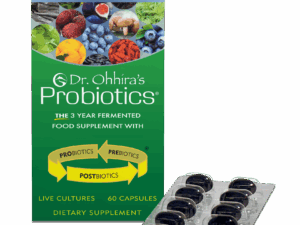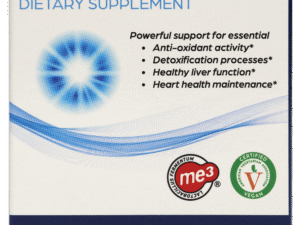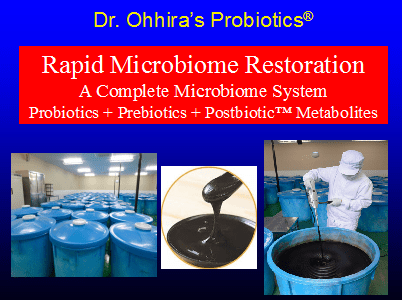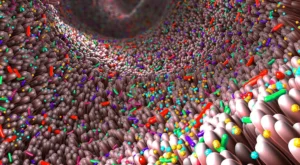Postbiotic metabolites is a term that refers to the vast array of compounds that are produced by the metabolic activity of your probiotic bacteria. These probiotic-produced postbiotic compounds play extremely important roles in the regulation of health and in the maintenance of a healthy microbiome.
This article will explain the many functions of postbiotic metabolites, how they get produced, the health problems associated with the under-production of postbiotic metabolites, and how to correct this problem.
Over 99% of the bacteria in the intestinal tract reside in the colon. Hence, the colon is the primary site of the gut microbiome. In his book The Mind-Gut Connection, Dr. Emirian Mayer states that “the bacteria in your microbiome transform the food you eat into “hundreds of thousands of metabolites.” Recent estimates suggest that the gut microbiome in healthy individuals consists of 3,000 to 5,000 species of bacteria totaling approximately 100 trillion bacteria. Various bacterial species possess unique DNA sequences, allowing them to generate distinct postbiotic metabolites. It is now understood that the health benefits often attributed to probiotic bacteria are actually due to the postbiotic metabolites the bacteria produce rather than from the bacteria themselves.
Prebiotics, Probiotics & Postbiotics: To have a healthy gut microbiome, you MUST feed your probiotic bacteria well. Different species of probiotic bacteria require different kinds of foods. The components in food that nourish probiotic bacteria are dietary fibers and polyphenols. The richest source of probiotic-friendly fibers and polyphenols are multicolored fruits and vegetables. Consuming a diet that contains a wide range of different fiber and polyphenol-rich foods is essential for the development of a healthy microbiome with a diverse population of probiotic bacteria.
In July 2022 my article titled The Malnourished Microbiome: American’s #1 Nutritional Deficiency was published in the peer-reviewed medical journal Integrative Medicine. https://pubmed.ncbi.nlm.nih.gov/35999904/
This article emphasizes the critical role that postbiotic metabolites play in regulating many aspects of health. This article also emphasizes that a diverse diet is required to support the growth of a diverse population of probiotic bacteria so that they can produce a diverse range of health-regulating postbiotic metabolites. IT ALL DEPENDS ON DIET…!!
Every time you eat, you are hosting a very large party; you are feeding 100 trillion guests—the probiotic bacteria in your gut microbiome. Unfortunately, most people do not consume a diet that promotes a healthy microbiome. Here are results from a some recently published studies:
- 87.8% of U.S. adults do not consume enough fruits
- 90% of U.S. adults do not consume enough vegetables
A recent survey of 50,000 commonly purchased foods in U.S. grocery stores reported the following:
- 73% of U.S. food supply is ultra-processed food (UPF)
- On average, Ultra-Processed Foods are 52% less expensive than healthier alternatives
Here’s another disturbing fact: in 2024, there were 213,155 fast food restaurants in the U.S. That’s an average of 4,283 fast food restaurants in every state in the United States. Americans are eating themselves into bad health. Bad diets create dysbiosis or bacterial imbalance. This results in gut inflammation, which damages the gut lining and allows harmful substances such as lipopolysaccharides (LPS) to pass into systemic circulation. This causes chronic inflammation throughout the body, which accelerates biological aging.
Over 2,000 years ago, Hippocrates is credited with saying, “All disease begins in the gut.” Hippocrates was right, bacterial imbalance and gut dysbiosis are a primary cause of chronic, age-related diseases.
The Oral Probiotic Dilemma: There are several reasons why orally ingested probiotics alone are often not very effective. First, stomach acid is over 10,000 times stronger than the acidity in the small intestine and the colon. Most orally ingested probiotic bacteria will be destroyed when they are exposed to stomach acid.
Another key issue is the availability of the right kinds of food for probiotic bacteria. If probiotics survive transit through the stomach, when they arrive in the colon, they need to access dietary fibers and polyphenols and begin the process of converting them into postbiotic metabolites. However, the colon in many people is like a food desert, which is a term that describes an urban area where it is difficult of find or buy good-quality fresh food.
Taking high-dose probiotics with billions of bacteria per dose (high CFUs), is like sending thousands of soldiers into battle with no food supply. They will quickly become hungry, become increasingly unable to perform their duties and if food is not supplied, they will starve. As detailed above, most Americans do not consume a diet that supports a healthy gut microbiome. When high-dose probiotics are ingested, most of the bacteria will be killed by stomach acid, or if they reach the colon, they will likely starve due to a lack of food (dietary fibers & polyphenols).
Most probiotic supplements just contain a high dose of one or several strains of probiotic bacteria. As discussed previously, several factors inhibit orally ingested probiotics from being effective. However, the multi-year fermentation process utilized in the production of Dr. Ohhira’s Probiotics allows the bacteria to spend three years (Original Formula) to five years (Professional Formula) fermenting the food they are provided with, which results in the production of over 500 postbiotic metabolites. Thus, when Dr. Ohhira’s Probiotics are encapsulated, you get probiotics, prebiotics AND postbiotics.
Regulating the Microbiome Ecosystem
Temperature is a critical regulator of the ecosystem for the health of plants, animals and humans on Earth. In the gut microbiome, the level of acidity (the acid/base balance) it the critical regulator of the ecosystem. The optimal level acidity for the microbiome is from pH 6.2 to 6.8, which is weakly acidic. This weakly acidic pH is optimal for promoting the growth and proliferation of probiotic bacteria and it inhibits the growth of pathogens. Dr. Ohhira’s Probiotics contain over 100 weakly acidic postbiotic metabolites. This is one of the most powerful attributes of Dr. Ohhira’s Probiotics, which explains why it is so successful at restoring health in the gut microbiome.
Here’s another analogy. Visualize a large section of the Amazon rainforest that has been clearcut by loggers. Hundreds of acres of trees lying horizontally, felled by chainsaws. You cannot fix this damaged ecosystem by just putting the inhabitants back into the damaged ecosystem. If you put the ants, bees, snakes, butterflies, and monkeys back into this damaged ecosystem, the animals won’t survive, and it won’t cause the trees to regrow.
It is similar in the gut microbiome. Gut dysbiosis is caused by too many bad bacteria. This results in gut inflammation, which damages the lining of the intestinal tract and allows intestinal permeability to happen. Just taking high-dose probiotics won’t fix this damaged ecosystem. Postbiotic metabolites function in numerous ways to repair and heal a damaged microbiome ecosystem. Taking Dr. Ohhira’s Probiotics delivers over 500 postbiotic metabolites, that helps to repair and/or maintain a healthy gut microbiome. Dr. Ohhira’s Probiotics helps improve your gut microbiome ecosystem, which then enables your innate probiotic bacteria to flourish and produce postbiotic metabolites.
Postbiotics: It Takes More Than Probiotic Bacteria to Create A Healthy Microbiome
Postbiotic compounds are the key regulators of gastrointestinal health and health throughout the rest of your body. Here are some of the known functions of various kinds of postbiotic metabolites:
- Many postbiotics are weakly acidic compounds that regulate the level of acidity in the microbiome. Examples include short-chain fatty acids (SCFAS), amino acids, nucleic acids, organic acids and fulvic acids. These compounds are an important part of the immune system because maintaining the optimal acid/base balance in the GI track promote the growth of beneficial probiotic bacteria and suppresses the growth of pathogens.
- Antimicrobial peptides (AMPs) are metabolites that are also an important part of the immune system. AMPs are natural antibiotics that kill or suppress the growth of bad bacteria.
- Many postbiotic metabolites exhibit anti-inflammatory activity.
- Butyrate is a postbiotic that accelerates healing to the gut lining. It is the primary energy source for growth of healthy new epithelial cells.
- We used to think we got all of our nutrition from the foods we eat. Now we’ve learned that numerous species of probiotic bacteria produce some of our essential nutrients including the all the B-vitamins (B1, B2, B3, B5, B6, B12, folic acid), vitamin K and several essential amino acids.
- It is estimated that from 70-80% of immune cells in the body are located in the gut. Many postbiotic metabolites help regulate your immune system.
- Hydrogen peroxide, which helps suppress the growth of candida and other yeasts
- Biodetoxification is one of the protective properties of some postbiotic metabolites; they bind to and help eliminate various toxins.
- Postbiotic metabolites help improve overall intestinal function and elimination.
- 10. Some postbiotic metabolites are important neurotransmitters such as GABA, serotonin and acetylcholine. These gut-derived neurotransmitters help communicate with the brain via the gut-brain axis and help regulate mood, emotions and anxiety.
- Numerous postbiotic metabolites function as antioxidants.
And, experts estimate that there are hundreds of thousands of postbiotic compounds that have yet to be discovered.
-
 Dr. Ohhira’s Probiotics®$13.95 – $89.95Price range: $13.95 through $89.95
Dr. Ohhira’s Probiotics®$13.95 – $89.95Price range: $13.95 through $89.95 -
 Dr. Ohhira’s® Probiotics Professional Formula$39.95 – $129.65Price range: $39.95 through $129.65
Dr. Ohhira’s® Probiotics Professional Formula$39.95 – $129.65Price range: $39.95 through $129.65 -
 Reg´Activ® Essential ME-3$39.95
Reg´Activ® Essential ME-3$39.95
Fourteen different organically grown foods (Japanese fruits, vegetables, mushrooms and seaweeds) are utilized in the multi-year fermentation process to produce Dr. Ohhira’s Probiotics. Thus, Dr. Ohhira’s Probiotics receive a more diverse diet of fiber and polyphenol-rich foods than the diets that most humans provide the bacteria in their intestinal tract. Also, Dr. Ohhira’s multi-year fermentation process results in the production of far greater amounts of the critical health-regulating postbiotic metabolites than most humans produce in their gut microbiome.
The Importance of Postbiotic Metabolites
At Essential Formulas, we are NOT suggesting that postbiotic metabolites be recommended to treat any diseases. Instead, we suggest that postbiotic metabolites play a critical role in creating and maintaining good health, which helps to prevent illnesses from developing. In an article that was published in the Journal of Immunology in Oct. 2021, author Cathryn Nagler stated the following, “It is now clear that the depletion of microbial metabolites beneficial to host health is associated with a rapid rise in non-communicable chronic diseases (NCCDs). Thus, it is increasingly clear that most chronic, age-related diseases are now linked to gut dysbiosis.
Rapid Microbiome Restoration
The information discussed in this article emphasizes how important it is to create and maintain a healthy gut microbiome ecosystem so that your probiotic bacteria can thrive and produce postbiotic metabolites. In addition to probiotics and prebiotics, Dr. Ohhira’s Probiotics delivers over 500 postbiotic metabolites, which help to normalize the gut microbiome environment. At Essential Formulas, we say Dr. Ohhira’s Probiotics deliver A Complete Microbiome System (probiotics, prebiotics & postbiotic metabolites), which accelerates Rapid Microbiome Restoration.* This is the Dr. Ohhira’s Advantage…!!
*These statements have not been evaluated by the Food and Drug Administration. This product is not intended to diagnose, treat, cure, or prevent any disease.






